Michael J. Kramer's Blog, page 19
November 27, 2022
Shattering Narrative History
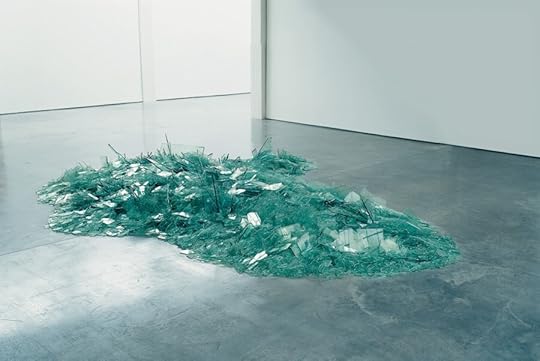 Robert Smithson, Map of Broken Glass (Atlantis), 1969.
Robert Smithson, Map of Broken Glass (Atlantis), 1969. X-posted from The Global Sixties: An Interdiscplinary Journal.
Kramer_Book-review_The-shattering-America-in-the-1960s_The-Global-Sixties_2022-10-29November 23, 2022
Love Me, Love Me, Love Me, I’m a G-Man
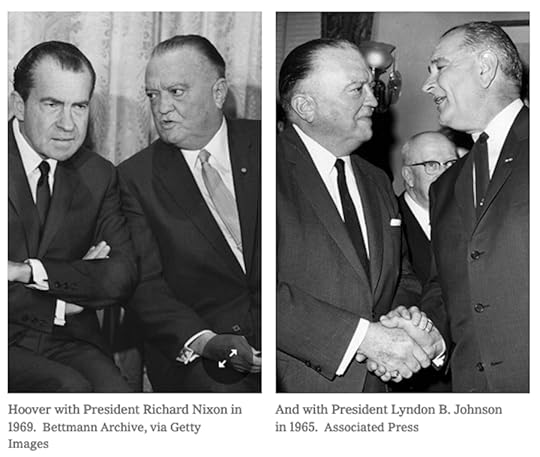
In the cleverly contrasting photographs of J. Edgar Hoover accompanying Beverly Gage’s essay in the New York Times, the head of the Federal Bureau of Investigation for almost a half century whispers conspiratorially in President Richard Nixon’s ear in one and softens his eyes for Lyndon Baines Johnson just a few years earlier in the other while he clasps LBJ’s hands warmly.
The images are meant to illustrate Gage’s argument: Hoover was not merely the sinister, reactionary, racist, anticommunist, strong-arm abuser of state power who went after Civil Rights, Black Power, and New Left activists in corrupt ways; he was also, for many years, a model of the professional crime-fighter and New Deal liberal state bureaucrat, a figure focused on efficient, decent civil service. Gage’s point is to bring out these contradictions, which are all the more on display these days due to a strange flip in American politics: now right-wingers attack the FBI; liberals increasingly defend it.
One wonders, however, if Gage has not gone far enough in puzzling out this contradiction. We might ask: what were the links between New Deal, liberal, anticommunist statism in the mid-twentieth century and the turn to reactionary, Machiavellian tactics? Is this less a contradiction than a telling revelation about the formations of power at the time? In these decades, a kind of hateful agreement emerged around radicalism as the dangerous Other in America. By only focusing on liberalism and conservatism and leaving radicalism out of the picture, Gage conflates contradiction with consensus, at least in her Times op-ed.
One thinks of Phil Ochs’ 1966 song, “Love Me, I’m a Liberal” as a better interpretation of the climate in which Hoover and the FBI emerged during the mid-twentieth century. Ochs gives the lie to a certain mode of mid-twentieth century liberalism that ultimately turned reactionary when pushed from the Left. As Ochs’ closing verse puts it:
Once I was young and impulsive
I wore every conceivable pin
Even went to the socialist meetings
Learned all the old union hymns
But I’ve grown older and wiser
And that’s why I’m turning you in
So love me, love me, love me, I’m a liberal
If we are to truly understand what made Hoover tick, perhaps we need to understand him not as a contradiction of liberal and conservative, but rather as the working out of that contradiction into a synthesis—postwar consensus liberalism—that was driven as much by the fear of more radical change as it was by its attempt to expand the welfare state in limited (but still meaningful) ways.
If Hoover was the ultimate “G-Man,” the head of the Feds, a master bureaucrat and civil servant working for the federal government, but sometimes pursuing rather startling unprofessional tactics to do so, this was perhaps less contradiction than consummation. How this G-Man’s government itself is to relate to those it governs, however, that remains an open case.
November 20, 2022
Articulating Stuart Hall
x-posted from Society for US Intellectual History Book Review.
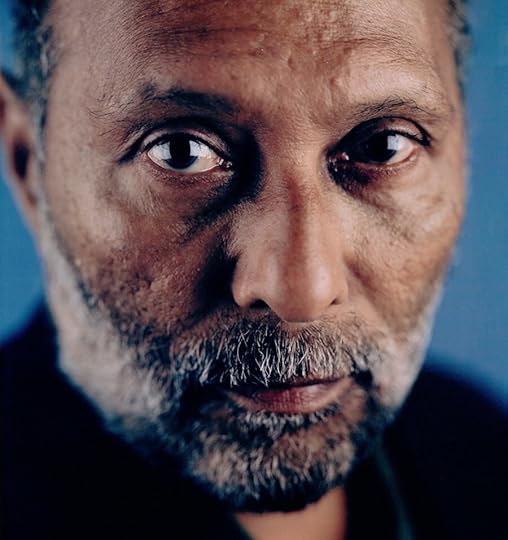 Stuart Hall. Photo: Dawoud Bey.
Stuart Hall. Photo: Dawoud Bey.What does a Jamaican-British thinker have to offer US intellectual history? A lot. Stuart Hall’s work presents three important possibilities for US intellectual historians: first, it asks US intellectual historians to continue to think more transnationally about the field; second, it provides rich source material for studying the intellectual history of the United States in the decades after World War II, in particular how to understand the adjacent field of Cultural Studies, which Hall was crucial in shaping in England before it spread to the American academy; and finally, Hall linked “theory” to historical inquiry itself in ways that make his writing methodologically useful—one might even say essential—for US intellectual historians.
Right on time comes a two-volume set of Hall’s Essential Essays. Hall, who died in 2014, shied away from compendia of his work, but editor David Morley strives to sum up the thinker’s career in productive selections of Hall’s writings. Many of the selections are essays, but just as often they are interviews. Hall was devoted to dialogue, and repeatedly he comes up with fascinating analyses and ideas through responses to his interlocutors, often former students who have gone on to do their own important research: “I’ve always worked with some kind of collectives,” he explains. “Without some sort of grouping I feel kind of lost. The idea of trying to do it all in my study on my own, doesn’t feel right.”[1] Even his essays themselves are a bit like interviews. They are less solo disquisitions than conversations with earlier thinkers. Hall perhaps grappled most with Antonio Gramsci, who focused on struggles for socialism within the complex spaces of modern industrialized societies that were not falling into the revolutionary dictates of dialectical materialism that Marx and Engels had predicted as inevitable. Marxism without guarantees, as Hall called it in one essay.[2] Hall also responded to the new ideas of British New Leftists such as Raymond Williams and E.P. Thompson. Just as often, he followed in the footsteps of less radical literary scholars who were growing interested in popular as well as high culture: figures such as Richard Hoggart and F.R. Leavis. Alongside Marxist traditions and British thinkers, Hall also rethought the legacies of sociologists such as Emile Durkheim and pioneers of structural linguistics and anthropology such as Claude Lévi-Strauss. To read Hall is to be invited into a kind of post-World War II transnational Republic of Letters that spans place and time but always circles back to two core issues: the intriguing theoretical issue of how history matters to how we interpret the present and the pressing political question of how to achieve a truly just and sustainable social democratic order in the future.
The first volume of the two Essential Essays books is subtitled Foundations of Cultural Studies and features classic Hall essays that shaped the new discipline he helped to form as member and then director of Birmingham University’s Centre for Contemporary Cultural Studies in the 1960s and 70s. It also includes reflections and retrospective accounts from Hall about the formation of the field. What is most striking about these pieces is just how persistent Hall was in seeking to blow out of the water vulgar Marxist dichotomies of base and superstructure. For Hall, the idea of separating material factors from cultural ones was entirely inadequate for trying to make sense of the modern world or how to improve it. Instead, he pioneered a richly conceptual and provocative method of linking political economy to culture and philosophy. If Marx turned Hegel on his head, Hall sought to flip Marx at least sideways again so that we could glimpse the ways in which ideas and material forces interacted to produce social relations.
The second volume, Identity and Diaspora, shifts to concerns that Hall began to explore more explicitly, and often biographically, in the 1980s and 90s. Editor Morley, however, wants us to notice that they hovered in the background all along. Morley’s goal with the second volume of Essential Essays is to decenter the rise of Cultural Studies from only an Anglo-American, Global North story.[3] His selections convincingly show how Hall sought to understand identity, globalization, and multiculturalism from the start even as these thematic interests emerged most fully later in his life. Born to a middle-class Jamaican family that lived through the independence of that nation from British colonial rule, Hall headed to England itself for school in the 1950s, just prior to Jamaica’s official departure from the British empire. Informed by the intersection of class and race within the legacies of imperialism, his own “empire strikes back” diasporic perspective most of all never separated matters of race from class, racism from class inequalities. Hall chose to view the two as intertwined. In our own time of divisive debates about such binaries, Hall’s insistence on not severing race from class while shifting both categories of analysis into a transnational framework is refreshing—and worth preserving.
Linking the two volumes is Hall’s particular attunement to two forces in the late twentieth century: the democratic potential (as well as the risks) of a new kind of global hybridity forged by shifting demands for both racial equality and economic justice; and a related rising power of a new kind of rightwing authoritarian populism that struck him as quite different from older modes of conservatism. Hall returned often to these two linked themes as he examined many topics: popular culture, Marxist theory, transatlantic diaspora, mass media, literature, anthropology, sociology, postmodernism, globalization, and identity. Even when moving into the finer details of intellectual abstraction, Hall’s concerns were never far from how ideas, intellectual life, and culture mattered in relation to the domain of raw political and economic power. The task of the Cultural Studies scholar was, he contended, not merely to position political economy against culture, but to go beyond the superficial distinctions between base and superstructure in order to notice how raw power always encompassed more cooked modes. Hegemony was rarely about sheer domination in the more messy, complex precincts of modern, industrialized civil societies; rather, it worked through more subtle, yet just as coercive, means. In Hall’s analysis, then, the theories of Gramsci and Lévi-Strauss were needed precisely because of the problematics of Margaret Thatcher and Ronald Reagan. Yet theory was never the point in of itself; it was always, for Hall, a means to an end. Even as he himself became celebrated, even fetishized, as a theorist among theorists in the lofty realm of academic Cultural Studies, he would always remind his interlocutors that “theory is always a detour on the way to something more important.”[4]
One might still ask: why should US intellectual historians care? There are two reasons.
First, Hall’s work offers important historical source material of the rise of Cultural Studies as an influential field itself infused with a diasporic spirit of transit across national boundaries. It demonstrates in detail how Cultural Studies emerged within the British context of the 1960s and 70s in part because of the flow of American popular culture into England. How, Hall and his colleagues at Birmingham University’s Centre for Contemporary Cultural Studies (CCCS) wondered, would British society change under the influence of US hegemony after World War II? At the same time, Hall’s work also traces the rich intellectual dimensions of the “reverse” diaspora of subjects of the British Empire back to the mother country after the 1940s. As subaltern, postcolonial populations, these new citizens remade British society. They challenged what it meant to be British itself. Hall’s version of Cultural Studies was at the cutting edge of thinking about these twin transformations of the United Kingdom. Then, amazingly, Cultural Studies circulated out to the Americas (and elsewhere) through new academic positions and influential critical cultural thinking. Late twentieth century US intellectual history needs to grapple with Hall because he was there, shaping and being shaped by these dynamics of transnational intellectual life, which we might understand as a latter-day Atlantic Crossing that echoes the Progressive Era circulations as chronicled by Daniel Rodgers.[5]
Second, not only does Hall’s thinking matter as primary source material, but his theories also matter methodologically for intellectual historians because they themselves were so rigorously historical. A more thorough encounter with his work, particularly his two key theoretical ideas of “articulation” and “conjuncture,” can aid intellectual historians who are keen to characterize the power of ideas in the US and the world during any era, not just during Hall’s own time and place.
On both counts, as source material and just as intriguingly as methodology, Hall’s own biography matters. After arriving in London from Jamaica in 1951 as a Rhodes Scholar, Hall immersed himself in the activities of the non-Stalinist British New Left, eventually serving as editor of New Left Review. His work in the 1960s found him expanding from his literary training into film, television, music, and other media through projects such as The Popular Arts, written with Paddy Whannel of the British Film Institute.[6] By the 1970s, as director of the Centre for Contemporary Cultural Studies, he began to deepen the cultural Marxism of Raymond Williams and the social history of E.P. Thompson into more subtle analyses of both “the popular” and culture. He was, as he put it, always “working within shouting distance of Marxism, working on Marxism, working against Marxism, working with it, working to try to develop Marxism.”[7] Rather than insist that culture springs directly from political economy, Hall turned to Gramsci and structuralists such as Lévi-Strauss, among others, to portray popular culture as a site of struggle over hegemonic notions of common sense, of ideology, of senses of reality itself, and of the horizon of the possible.
From these careful dialogues with past theoreticians, the new theories of Cultural Studies were born by Hall and his colleagues and students. As Hall readily notes, this was not without its own heated discussions, debates, and disagreements. There was never a party line at the CCCS. Nonetheless, the exciting intellectual climate and numerous studies about race and class in the UK triumphantly crossed the Atlantic by the 1980s in a sort of intellectual British Invasion that accompanied the rise of French theory in the American academy as well. So too it influenced cultural critics and other commentators at the time. Hall’s students took over prominent positions at elite institutions. His approach percolated through newspapers, books, and other organs of national and international meaning-making. Perhaps the history of the times demanded this. How else could one effectively explain the rise to political power of pop culture figures such as Reagan (or later, Donald Trump)? A more capacious and sophisticated understanding of how popular culture relates to politics was required. Hall had been thinking through these questions for many years and had valuable suggestions to offer.
Today, however, serious historical work on popular culture is mostly on the outs as an area of study. There has been a hard turn toward more narrow definitions of political economy, law, diplomacy, and activism. Hall would not have opposed these turns, but he might have questioned the simplification of popular culture to a mere superficial dimension of deeper power struggles. For him, popular culture was where the action was, yet we barely knew how to analyze it thoughtfully as it related to other levels of social life. We lacked, in short, a solid intellectual history method for examining popular culture as a site of power and contingency. To this day, historians tend to return to the very base-superstructure framework Hall found dubious. For many, pop culture is fluff, not real history. Or it is mere reflection, not an area of human activity that itself is causal or crucial to historical changes or continuities. Other historians shift in a cartoonish opposite direction. For them, pop culture’s zones of representation are all that matter. Power can be challenged merely through the symbolic transgression of norms. Therefore, these are all a scholar needs to notice and analyze. Hall’s intervention was to insist that neither of these positions would do. One could neither dismiss popular culture as meaningless, nor fetishize it as political action unto itself.
For Hall, the contradictions of popular culture required a far more sophisticated theorization. Moreover, in his work, that theorization was, at its core, a distinctive mode of historicization. As Hall wrote in one of his most potent essays, “Notes on Deconstructing ‘the Popular,” published in 1981: “There is no whole, authentic, autonomous ‘popular culture’ which lies outside the field office of the relations of cultural power and domination.”[8] Hall believed instead that “cultural struggle…takes many forms: incorporation, distortion, resistance, negotiation, recuperation.” What was needed was a more nuanced way of analyzing these “many forms.” Hall thought that “Raymond Williams has done us a great deal of service by outlining some of these processes, with his distinction between emergent, residual, and incorporated moments.” That said, “We need to expand and develop this rudimentary schema.”[9]
What mattered most of all to Hall was to theorize better how different levels of society linked to each other through complex interactions. How, he wondered, did the “hidden abode of production” that Marx described as the place that generated social relations and social reality relate to the “noisy spheres” of civil society, market exchange, institutions, state power, and cultural activity?[10] For Hall, theorizing the connections among these different levels and spheres of society required careful historicization most of all. When it came to popular culture, he argued, “The important thing is to look at it dynamically: as a historical process”. If one did so, Hall believed, “Popular culture is one of the sites where this struggle for and against a culture of the powerful is engaged: it is also the stake to be won or lost in that struggle. It is the arena of consent and resistance. It is partly where hegemony arises, and where it is secured.”[11]
Bringing together Gramsci with Lévi-Strauss and others, Hall built upon Williams’ cultural Marxism with a series of intellectual moves that opened up fresh vantage points on how and why popular culture was important to study and understand in more sophisticated ways. This was because pop culture never simply arrived intact; it was always fragmented and contested, a place of swirling, unstable ideas. If one could read its clues well, noticing the deeper structures of meaning and power embedded in them, and how those deeper structures related to other dimensions of social organization, one might be able to name, analyze, and maybe even shape the situation more effectively.
In what Hall called the tradition of Raymond Williams’ “radical interactionism,” which paid attention to the particular connections among different levels of social life (economics at the point of production, popular culture, politics, law, institutions, ideologies), one might be able to figure out how power operated in modern industrial and postindustrial societies. The point for Hall was neither to dismiss, nor merely to celebrate culture. It was never mere fluff, nor was it worth studying merely to note moments of cultural transgression. Much more subtly, Hall thought that pop culture was “one of the places where socialism might be constituted.” For him, in the somewhat controversial ending to his essay “Notes on Deconstructing ‘the Popular’,” “that is why ‘popular culture’ matters. Otherwise, to tell you the truth, I don’t give a damn about it.”[12]
Hall’s line of thinking here on popular culture serves as both a primary source for studying Cultural Studies and a still-relevant theoretical and methodological tool. As evidence from the past, it reveals a particular moment in the development of American mass culture as a global phenomenon during the last decades of the twentieth century. This was an era in which the culture industries still dominated as top-down institutions, shaping culture, but a large-scale loosening of their control over content, distribution, and consumption was in play. Intellectual historians might look to Hall’s writing as a window on ideas in this history. They are of their time. At the same time, Hall’s theorizations leap out from their moment. His insistence that we look to the contradictions of a particular historical era applies across epochs. Too often, however, US historians of culture have stopped at this point, noting the contradictions without explaining them fully (how many cultural histories of the last 30 years settled for an unsatisfying “both resisted and reasserted” argument about how power operated through cultural means?). Hall’s significance is to attempt better ways of analyzing contradiction. His elaboration of concepts such as “articulation” and “the conjuncture” provides the means for dissecting contradictory forces more precisely. Hall might have even described his own essays as efforts to “articulate” different ideas to each other in the “conjuncture” of the rising forces of globalization, righting populism, and neoliberalism during the 1970s and 80s.
Hall liked the term “articulation” in part because of its multiple meanings. It signaled the act of speaking and also of placing one thing aside another as well as a joint used to extend an appendage or limb. Which is to say it linked speaking to action, ideas to their potential effects in the world. Drawing on structuralism, which treated culture as a language with underlying logics and arrangements, Hall imagined that one goal of Cultural Studies was to delve below surfaces in order to notice deeper levels at which social forces aligned with each other even if they seemed, at first glance, contradictory. For him, articulation “contains the danger of a high formalism,” but he also believed “it also has the considerable advantage of enabling us to think of how specific practices (articulated around contradictions which do not all arise in the same way, at the same point, in the same moment) can nevertheless be thought together.”[13]
Note Hall’s emphasis on contradictions playing out in complex, even chaotic ways, across time. For him, the concept of articulation helped to move from simply noticing contradictions, to noticing the specifics of how their power functioned as the motors of history: “A theory of articulation,” he explained in one interview, was for him “both a way of understanding how ideological elements come, under certain circumstances, to cohere together within a discourse” and also “a way of asking how they do or do not become articulated, at specific conjunctures, to certain political subjects.”[14] Why do some contradictory ideas stick together and others fall about? Historians might make use of Hall’s concept of “articulation” to consider contradictory ideas as potent historical causalities if we more carefully embed them in their contexts rather than dismiss contradictions as proof of failure—or worse yet, leave them floating there as incomplete analysis. Contradictions are not a satisfactory reason why certain ideas failed to gain hold historically. Nor are they useful as a conclusion or endpoint of historical analysis. Hall’s point was that we look to contradictions as structuring forces, as “articulations” of competing or conflicting ideas that could be “thought together.”
To do so, he contended, “enables us to think how an ideology empowers people, enabling them to begin to make some sense or intelligibility to their socio-economic or class location or social position.”[15] Contradictions were not moments of history falling apart in Hall’s thinking, but of history gathering steam. The ways in which particular ideas became articulated to others even if they were contradictory–and usually they were—could be the task of the social observer, the Cultural Studies scholar, the intellectual. Finding fresh articulations of contradictory ideas in service of social democracy could be the goal of the politically engaged thinker.
If Hall’s notion of articulation provides a potential tool for US intellectual historians to understand contradictory ideas as historical forces, the concept of the “conjuncture” can help them to study the contingencies in which these ideas erupt or fade. From one kind of contradiction (ideas articulated to each other) to another: material and political forces colliding in unexpected ways. Hall took the term from Marxists such as Gramsci and Althusser as well as from Annales School historians such as Fernand Braudel. For Hall it “designates a specific moment in the life of a social formation and refers to a period when the antagonisms and contradictions, which are always at work in society, begin to ‘fuse’ into ruptural unity,'” as Althusser put it.[16] As Hall explains it, conjunctural analysis:
deploys a type of periodization based on a distinction between moments of relative stability and those of intensifying struggles and unrest, which may result in a more general social crisis. The concept covers the development of contradictions, their fusion into a crisis, and its resolution. Resolutions to the crisis can take different forms: there is no preordained result. They may allow the historical project to continue or be renewed; or they may provoke a processor transformation. In some cases, protracted struggle may continue without resolution (what Gramsci calls ‘a passive revolution’). Conjunctures have no fixed duration, but so long as the crisis (and its underlying contradictions) remain unresolved, further crises are likely to proliferate and echo around different domains of the social formation. So long as a period is dominated by roughly the same struggles and contradictions and the same efforts to resolve them, it can be said to constitute the same conjuncture.[17]
If articulation spoke to how contradictory ideas could be sustained, the conjuncture was about how contradictions produced crisis and rupture in time, in history. Theorizing the conjuncture was a path, Hall believed, to periodizing history more effectively by paying attention to the contradictions in play: where they the same contradictions as before or were they resolving into new contradictions? At which levels of social organization were these contradictions located, among which groups, in what sorts of combinations?
Overall, Hall harnessed the concepts of articulation and the conjuncture to analyze everything from popular culture to how media was encoded and decoded to the growth of the carceral state to the rise of a Diasporic black consciousness. Perhaps most significantly, he also noticed the growth of a new sort of rightwing ideology during the post-1960s decades that appealed to many British and American citizens. It did so not because it made sense or resolved contradictions, but rather because it conjoined (articulated!) a set of contradictory ideas into a seemingly intuitive “common sense” and did so in a moment of social crisis, a conjuncture constituted by the failure of social democracy after World War II to deliver fully on its political, economic, and cultural promises. It is this historical failure in which Hall’s essays and interviews might be positioned as intellectual history. The methods he developed out of that crisis then carry over into historical inquiries about ideas during any place or at any time.
Why does Stuart Hall matter for US intellectual history? As Hall himself commented, “I’m not a historian, but the notion of conjuncture and historical specificity gives my thinking and writing a certain ever-present historical cast.” For him, “if you have a historical cast of mind, you just aren’t persuaded that everything can start from the beginning.” Instead, he insisted, “I don’t really believe in origins of that kind. I don’t believe in origins culturally; I don’t believe in them in terms of identity; and I don’t believe in them in terms of history and politics.”[18]
Here we get to what might be the most essential essence of Hall’s significance as presented in Essential Essays: his foundational insistence on anti-foundationalism. This stance was, Morley’s edited volumes propose, shaped by Hall’s own diasporic biography. It was also influenced by his profound engagements with a wide range of thinkers and theorists. Biographical factors and a commitment to intellectual dialogue produced for Hall a sense that the one constant of history is that it remains fraught and alive. For him, history is hinged, not unhinged. It is always linked to the multidimensional contradictions of base and superstructure, production and consumption, politics and culture, the mediated and the mediating, institutional forces and free-flowing social dynamics, the material and the ideational.
In this way, in their own moment, or at any time for that matter, both as US intellectual history and for, Stuart Hall’s sophisticated anti-essentialist thinking remains essential reading.
Hall’s Essays: A PrimerThere are many other Hall essays and books to explore. You can find a full bibliography, compiled by Catherine Hall, Bill Schwarz, and Nick Beech, at the Stuart Hall Foundation website. Below are selected key essays, by topic, from the two-volume Essential Essays collection. — Michael J. Kramer
On Cultural StudiesCultural Studies: Two Paradigms (1980)On Postmodernism and Articulation: An Interview with Stuart Hall by Larry Grossberg and Others (1986)Cultural Studies and Its Theoretical Legacies (1992)Richard Hoggart, The Uses of Literacy, and the Cultural Turn (2007)On MarxismRethinking the “Base and Superstructure” Metaphor (1977)Gramsci’s Relevance for the Study of Race and Ethnicity (1986)On Popular CultureNotes on Deconstructing “the Popular” (1981)What Is This “Black” in Black Popular Culture? (1995)On Media StudiesEncoding and Decoding in the Television Discourse (originally 1973; republished 2007)Culture, the Media, and the “Ideological Effect” (1977)On the New RightPolicing the Crisis: Preface to the 35th Anniversary Edition, with Chas Critcher, Tony Jefferson, John Clarke, and Brian Roberts (2013)The Great Moving Right Show (1979)On Race and DiasporaThe West and the Rest: Discourse and Power (1992)The Formation of a Diasporic Intellectual: An Interview with Kuan-Hsing Chen (1996)Thinking the Diaspora: Home-Thoughts from Abroad (1999)Through the Prism of an Intellectual Life (2007)At Home and Not at Home: Stuart Hall in Conversation with Les Back (2008)Trailer for The Stuart Hall Project, dir. John Akomfrah, 2013[1] Stuart Hall, quoted in David Morley, “General Introduction: A Life in Essays,” in Essential Essays Volume 1, edited and with an introduction by David Morley (Durham, NC: Duke University Press, 2019), 4.
[2] Stuart Hall, “The Problem of Ideology—Marxism without Guarantees,” Journal of Communication Inquiry 10, 2 (June 1986): 28–44.
[3] Morley, “General Introduction,” 4.
[4] Hall, “Old and New Identities, Old and New Ethnicities,” in Essential Essays Volume 2, edited and with an introduction by David Morley (Durham, NC: Duke University Press, 2019), 64.
[5] Daniel Rodgers, Atlantic Crossings: Social Politics in a Progressive Age (Cambridge, MA: Harvard University Press, 2001). See also, Joel Pfister, “British New Left Cultural Studies’ Transnational Critique of the United States,” in Critique for What?
Cultural Studies, American Studies, Left Studies (New York: Routledge, 2006), 49-83.
[6] Stuart Hall and Paddy Whannel, The Popular Arts: A Critical Guide to the Mass Media (London: Hutchinson Educational, 1964).
[7] Hall, “Cultural Studies and its Theoretical Legacies,” in Essential Essays, Volume 1, 74.
[8] Hall, “Notes on Deconstructing “the Popular,” in Essential Essays, Volume 1, 353.
[9] Hall, “Notes,” 357.
[10] Hall, “Rethinking the ‘Base and Superstructure’ Metaphor,” in Essential Essays, Volume 1, 163.
[11] Hall, “Notes,” 360.
[12] Hall, “Notes,” 360.
[13] Hall, “Cultural Studies: Two Paradigms,” in Essential Essays, Volume 1, 63.
[14] Hall, quoted in “Politics, Contingency, Strategy: An Interview with David Scott,” Essential Essays, Volume 2, 235.
[15] Hall, “On Postmodernism and Articulation,” 235.
[16] Hall quotes Louis Althusser, “Contradiction and Overdetermination” (1962) in For Marx, trans. Ben Brewster (1965; reprint, 2005, New York: Verso, 2005), 100.
[17] Stuart Hall, “Policing the Crisis: Preface to the 35th Anniversary Edition,” in Essential Essays, Volume 1, 368.
[18] Stuart Hall, quoted in “At Home and Not at Home: Stuart Hall in Conversation with Les Back,” Essential Essays, Volume 2, 289.
November 8, 2022
The Limits of Writing
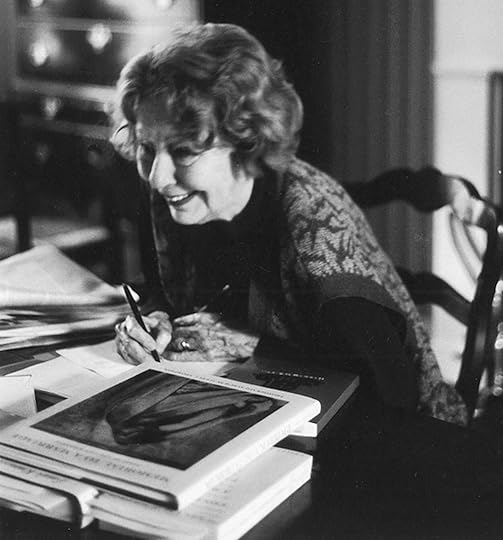 Elizabeth Hardwick, 1991. Photo: Dominique Nabokov.
Elizabeth Hardwick, 1991. Photo: Dominique Nabokov.You are always confronted with the limits of yourself, your knowledge, your ear, your character…. And for that reason, writing is a very daunting activity and it will not make you happy.
— Elizabeth Hardwick
November 5, 2022
The Story Knows Us
 Joy Williams: Photo: Jonno Rattman.
Joy Williams: Photo: Jonno Rattman.The significant story possesses more awareness than the writer writing it. The significant story is always greater than the writer writing it. This is the humble absurdity, the disorienting truth, the exhilarating transmutability, this is the koan of writing. . . . The writer writes to serve—hopelessly he writes in the hope that he might serve—not himself and not others, but that great cold elemental grace that knows us.
— Joy Williams
November 1, 2022
Getting Past the Past
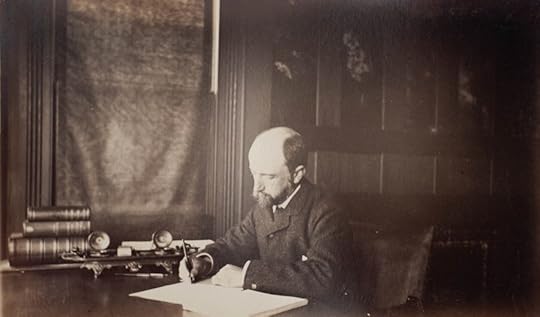
History never tells us what we need to know!
— Henry Adams
Prose vs. Poetry
 Lera Auerbach, Opening.
Lera Auerbach, Opening.Prose has a formal spaciousness and operates in an interrogative mood. It’s saner than poetry, and those who think poetry’s derangements are a corrupt or juvenile or self-dramatizing belief are welcome to their measured rationalism. The orders of poetry clarify, enhance, and preserve the disorders of experience. There are voices at my shoulder when I’m writing poems; when I write prose I’m talking back at those voices. Few intellectual pleasures match the satisfaction of becoming lost or disoriented in a passage of prose and trying to understand, in the process of writing, how I got there, then finally finding my way out. Prose is the act of writing toward an understanding. I don’t write poetry to find understanding, or map out its process: understanding is beside the point—the point being expressiveness, the stretched sustained appeal or prayer or shout that a poem can be. Poetry is an act of beseeching, even when it’s asking for nothing at all: it presents as beseeching. I ask of my poems, ‘What do you want of me, from me?’ or ‘Leave me alone a moment’ or ‘What can I offer you?’ Poetry asks the same of me. It’s an entity greater than my own minor being. Prose marks or draws or narrates the extension and limits of my being. Of the two, prose is a better citizen.
— W.S. Di Piero, Threepenny Review, Spring 2019
Soundscapes

All noises swell to form landscapes.
— Walter Benjamin, On Hashish
October 31, 2022
Rovings
 Wangechi Mutu, Nyoka (2022). Photo: D’Angelo Lovell Williams.SoundsFred Rzewski (h/t Richard Cándida Smith)
Variations United Will Never Be Defeated
“Dreadful Memories” from North American BalladsMarc-André Hamelin plays Rzewski: North American Ballads Nos. 3 & 4Daniel Glover plays Frederic Rzewski: Down By the Riverside, North American Ballad No. 3Four North American Ballads II: “Which Side Are You On?”Dan Zanes, Parades And Panoramas: 25 Songs Collected By Carl Sandburg For The American SongbagBig Joe Williams and Alan Lomax, New York City 2/66Marvel Wastelanders: DoomThe Walter Benjamin Broadcasts, BBC4Nina Berman & Steven Beck, Milton Babbitt: Works for Treble Voice and PianoAlice Cohen, “Under Chandeliers”Maggie Nicols, “Music Is The Healing Force Of The Universe”Kitchen And The Plastic Spoons, “Happy Funeral”Gramaphoney Baloney, 29 August 2022WordsKyle T. Mays, Hip Hop Beats, Indigenous Rhymes: Modernity and Hip Hop in Indigenous North AmericaDaphne Brooks, Liner Notes for the Revolution: The Intellectual Life of Black Feminist SoundRobert Fink, Repeating Ourselves: American Minimal Music as Cultural PracticePhilip J Deloria, Indians in Unexpected PlacesGlenda Gilmore, Romare Bearden in the Homeland of His Imagination: An Artist’s Reckoning with the South Peter Shapiro, The Music Never Stops: What Putting on 10,000 Shows Has Taught Me About Life, Liberty, and the Pursuit of MagicLindsay Zoladz, “Behind Wilco’s 2001 Masterpiece, a Band Breaking Its Heart,” New York Times, 3 October 2022Elizabeth Ellis and Rose Stremlau, “Land Acknowledgments: Helpful, Harmful, Hopeful,” Perspectives in History, 5 October 2022Robert Kuttner, “How the Center Enables Fascism,” TAP, 19 October 2022Mick Herron, Real TigersThomas Pynchon, Bleeding EdgeToni Morrison, BelovedAdorno’s “Motifs”: a selection, A collection of aphorisms on music written by Theodor Adorno between 1927 and 1951,” Verso Books Blog, 22 February 2018Jon Pareles and others, “50 Years Ago, Stevie Wonder Heard the Future,” New York Times, 27 October 2022Vanessa Barbara, “We Might Finally Be Free From the Madness of Bolsonaro, ” New York Times, 31 October 2022“Walls”Diana Wege, Sacred Site @ Olana State Historic Site Wangechi Mutu @ Storm KingDavid Smith, Five Units Equal @ Storm KingRichard Serrra @ DIA:BeaconHear Me Now: The Black Potters of Old Edgefield, South Carolina @ Metropolitan Museum of Art Winslow Homer: Crosscurrents @ Metropolitan Museum of ArtSharing Circles: Carol Newhouse and the WomanShare Collective @ Wexner Center for the ArtsBob Thompson: This House Is Mine @ Smart Museum of ArtThomas Cole National Historic SiteRaymon Elozua: Structure/Dissonance @ Everson Museum of ArtForever is Composed of Nows @ Everson Museum of ArtRaymon Elozua, Vanishing CatskillsRaymon Elozua, HomescrapThe Catskills Institute“Stages”Marx in Soho @ MuCCC, 19 October 2022The “Wacons” @ Hardly Strictly Bluegrass Festival, 1 October 2022Elvis Costello @ Hardly Strictly Bluegrass Festival, 1 October 2022Wilco @ Carol’s Pub, 9 October 2022Michael Kazin, “What it Took to Win: A History of the Democratic Party” @ Washington History Seminar, 25 May 2022ScreensEcotopia, dir. Ruth Dusseault
Diggers dispense free food in Haight-Ashbury
Andor, Season 01House of the Dragon, Season 01Through the Looking GlassShantaram, Season 01
Wangechi Mutu, Nyoka (2022). Photo: D’Angelo Lovell Williams.SoundsFred Rzewski (h/t Richard Cándida Smith)
Variations United Will Never Be Defeated
“Dreadful Memories” from North American BalladsMarc-André Hamelin plays Rzewski: North American Ballads Nos. 3 & 4Daniel Glover plays Frederic Rzewski: Down By the Riverside, North American Ballad No. 3Four North American Ballads II: “Which Side Are You On?”Dan Zanes, Parades And Panoramas: 25 Songs Collected By Carl Sandburg For The American SongbagBig Joe Williams and Alan Lomax, New York City 2/66Marvel Wastelanders: DoomThe Walter Benjamin Broadcasts, BBC4Nina Berman & Steven Beck, Milton Babbitt: Works for Treble Voice and PianoAlice Cohen, “Under Chandeliers”Maggie Nicols, “Music Is The Healing Force Of The Universe”Kitchen And The Plastic Spoons, “Happy Funeral”Gramaphoney Baloney, 29 August 2022WordsKyle T. Mays, Hip Hop Beats, Indigenous Rhymes: Modernity and Hip Hop in Indigenous North AmericaDaphne Brooks, Liner Notes for the Revolution: The Intellectual Life of Black Feminist SoundRobert Fink, Repeating Ourselves: American Minimal Music as Cultural PracticePhilip J Deloria, Indians in Unexpected PlacesGlenda Gilmore, Romare Bearden in the Homeland of His Imagination: An Artist’s Reckoning with the South Peter Shapiro, The Music Never Stops: What Putting on 10,000 Shows Has Taught Me About Life, Liberty, and the Pursuit of MagicLindsay Zoladz, “Behind Wilco’s 2001 Masterpiece, a Band Breaking Its Heart,” New York Times, 3 October 2022Elizabeth Ellis and Rose Stremlau, “Land Acknowledgments: Helpful, Harmful, Hopeful,” Perspectives in History, 5 October 2022Robert Kuttner, “How the Center Enables Fascism,” TAP, 19 October 2022Mick Herron, Real TigersThomas Pynchon, Bleeding EdgeToni Morrison, BelovedAdorno’s “Motifs”: a selection, A collection of aphorisms on music written by Theodor Adorno between 1927 and 1951,” Verso Books Blog, 22 February 2018Jon Pareles and others, “50 Years Ago, Stevie Wonder Heard the Future,” New York Times, 27 October 2022Vanessa Barbara, “We Might Finally Be Free From the Madness of Bolsonaro, ” New York Times, 31 October 2022“Walls”Diana Wege, Sacred Site @ Olana State Historic Site Wangechi Mutu @ Storm KingDavid Smith, Five Units Equal @ Storm KingRichard Serrra @ DIA:BeaconHear Me Now: The Black Potters of Old Edgefield, South Carolina @ Metropolitan Museum of Art Winslow Homer: Crosscurrents @ Metropolitan Museum of ArtSharing Circles: Carol Newhouse and the WomanShare Collective @ Wexner Center for the ArtsBob Thompson: This House Is Mine @ Smart Museum of ArtThomas Cole National Historic SiteRaymon Elozua: Structure/Dissonance @ Everson Museum of ArtForever is Composed of Nows @ Everson Museum of ArtRaymon Elozua, Vanishing CatskillsRaymon Elozua, HomescrapThe Catskills Institute“Stages”Marx in Soho @ MuCCC, 19 October 2022The “Wacons” @ Hardly Strictly Bluegrass Festival, 1 October 2022Elvis Costello @ Hardly Strictly Bluegrass Festival, 1 October 2022Wilco @ Carol’s Pub, 9 October 2022Michael Kazin, “What it Took to Win: A History of the Democratic Party” @ Washington History Seminar, 25 May 2022ScreensEcotopia, dir. Ruth Dusseault
Diggers dispense free food in Haight-Ashbury
Andor, Season 01House of the Dragon, Season 01Through the Looking GlassShantaram, Season 01
October 28, 2022
Mance Lipscomb’s Silhouette Talk
Lots of great scholarship and discussion at Curating for Change: The Work That Music Festivals Do in the World Virtual Conference. A recording of my talk is available at the conference website. It expands upon recent research I have been doing on the Berkeley Folk Music Festival.
Mance Lipscomb’s Silhouette: Region, Race, Expertise, and Digitization at the Berkeley Folk Music Festival Project – A presentation by Michael J. Kramer



